The Ethical Justification of Net Neutrality
VerifiedAdded on 2019/10/30
|7
|2187
|128
Essay
AI Summary
This essay discusses the ethics of net neutrality, analyzing it through the lenses of four classical ethical theories: Utilitarianism, Deontology, Virtue Ethics, and Contract Theory. It concludes that net neutrality is ethically correct according to all these theories. The essay explains each theory's perspective on net neutrality, highlighting how it promotes equality, fairness, and individual freedom.
Contribute Materials
Your contribution can guide someone’s learning journey. Share your
documents today.
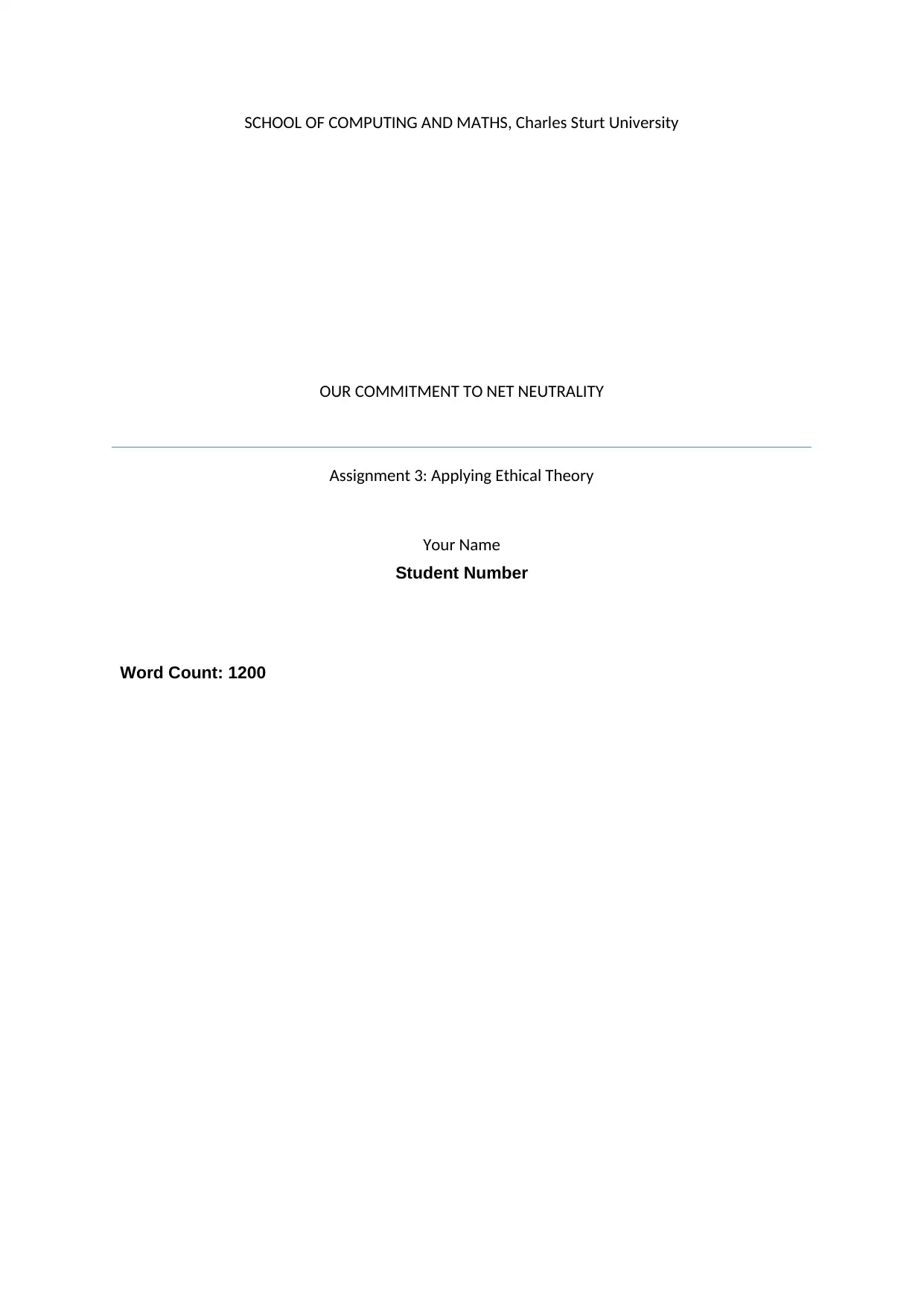
SCHOOL OF COMPUTING AND MATHS, Charles Sturt University
OUR COMMITMENT TO NET NEUTRALITY
Assignment 3: Applying Ethical Theory
Your Name
Student Number
Word Count: 1200
OUR COMMITMENT TO NET NEUTRALITY
Assignment 3: Applying Ethical Theory
Your Name
Student Number
Word Count: 1200
Secure Best Marks with AI Grader
Need help grading? Try our AI Grader for instant feedback on your assignments.
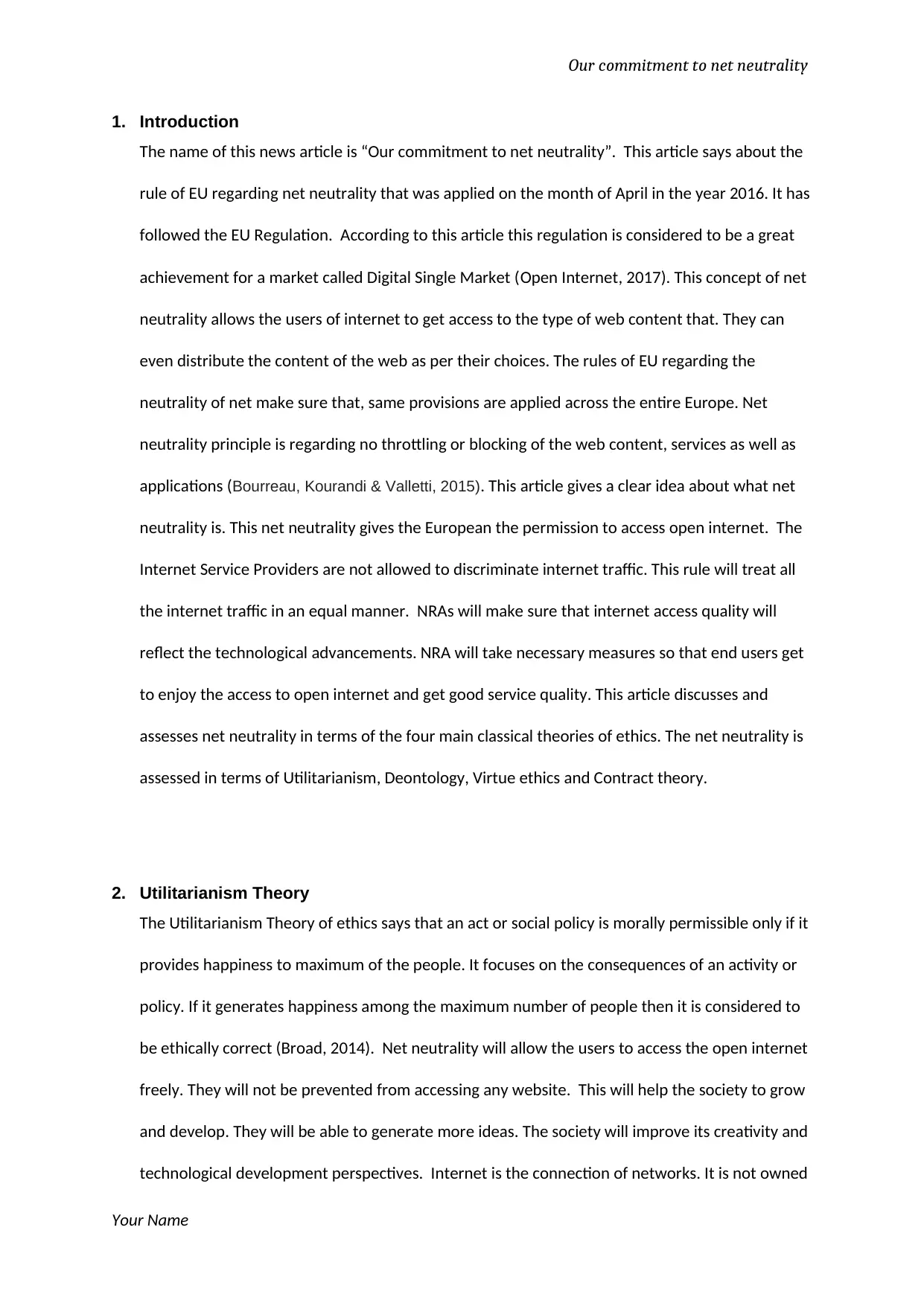
Our commitment to net neutrality
1. Introduction
The name of this news article is “Our commitment to net neutrality”. This article says about the
rule of EU regarding net neutrality that was applied on the month of April in the year 2016. It has
followed the EU Regulation. According to this article this regulation is considered to be a great
achievement for a market called Digital Single Market (Open Internet, 2017). This concept of net
neutrality allows the users of internet to get access to the type of web content that. They can
even distribute the content of the web as per their choices. The rules of EU regarding the
neutrality of net make sure that, same provisions are applied across the entire Europe. Net
neutrality principle is regarding no throttling or blocking of the web content, services as well as
applications (Bourreau, Kourandi & Valletti, 2015). This article gives a clear idea about what net
neutrality is. This net neutrality gives the European the permission to access open internet. The
Internet Service Providers are not allowed to discriminate internet traffic. This rule will treat all
the internet traffic in an equal manner. NRAs will make sure that internet access quality will
reflect the technological advancements. NRA will take necessary measures so that end users get
to enjoy the access to open internet and get good service quality. This article discusses and
assesses net neutrality in terms of the four main classical theories of ethics. The net neutrality is
assessed in terms of Utilitarianism, Deontology, Virtue ethics and Contract theory.
2. Utilitarianism Theory
The Utilitarianism Theory of ethics says that an act or social policy is morally permissible only if it
provides happiness to maximum of the people. It focuses on the consequences of an activity or
policy. If it generates happiness among the maximum number of people then it is considered to
be ethically correct (Broad, 2014). Net neutrality will allow the users to access the open internet
freely. They will not be prevented from accessing any website. This will help the society to grow
and develop. They will be able to generate more ideas. The society will improve its creativity and
technological development perspectives. Internet is the connection of networks. It is not owned
Your Name
1. Introduction
The name of this news article is “Our commitment to net neutrality”. This article says about the
rule of EU regarding net neutrality that was applied on the month of April in the year 2016. It has
followed the EU Regulation. According to this article this regulation is considered to be a great
achievement for a market called Digital Single Market (Open Internet, 2017). This concept of net
neutrality allows the users of internet to get access to the type of web content that. They can
even distribute the content of the web as per their choices. The rules of EU regarding the
neutrality of net make sure that, same provisions are applied across the entire Europe. Net
neutrality principle is regarding no throttling or blocking of the web content, services as well as
applications (Bourreau, Kourandi & Valletti, 2015). This article gives a clear idea about what net
neutrality is. This net neutrality gives the European the permission to access open internet. The
Internet Service Providers are not allowed to discriminate internet traffic. This rule will treat all
the internet traffic in an equal manner. NRAs will make sure that internet access quality will
reflect the technological advancements. NRA will take necessary measures so that end users get
to enjoy the access to open internet and get good service quality. This article discusses and
assesses net neutrality in terms of the four main classical theories of ethics. The net neutrality is
assessed in terms of Utilitarianism, Deontology, Virtue ethics and Contract theory.
2. Utilitarianism Theory
The Utilitarianism Theory of ethics says that an act or social policy is morally permissible only if it
provides happiness to maximum of the people. It focuses on the consequences of an activity or
policy. If it generates happiness among the maximum number of people then it is considered to
be ethically correct (Broad, 2014). Net neutrality will allow the users to access the open internet
freely. They will not be prevented from accessing any website. This will help the society to grow
and develop. They will be able to generate more ideas. The society will improve its creativity and
technological development perspectives. Internet is the connection of networks. It is not owned
Your Name
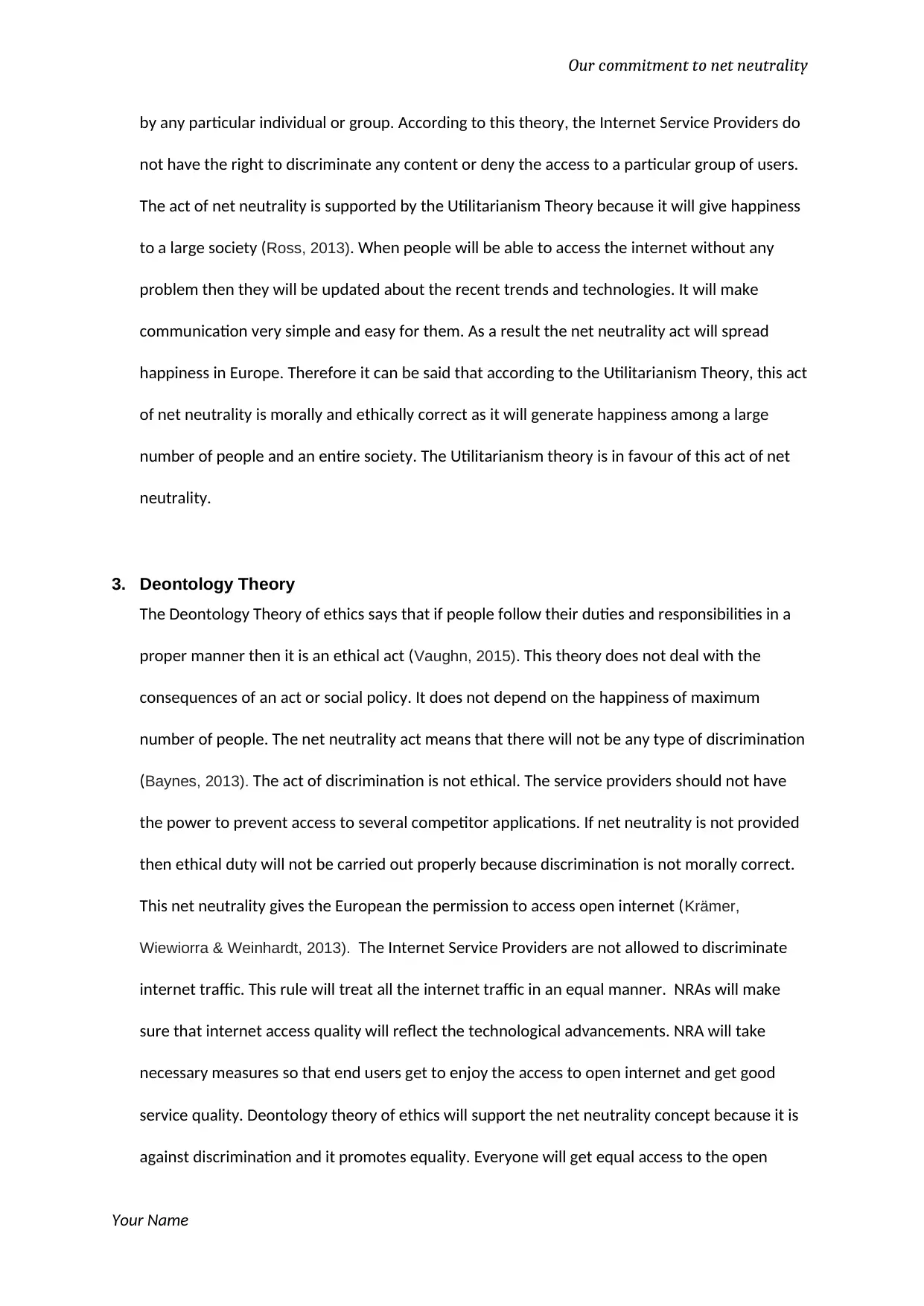
Our commitment to net neutrality
by any particular individual or group. According to this theory, the Internet Service Providers do
not have the right to discriminate any content or deny the access to a particular group of users.
The act of net neutrality is supported by the Utilitarianism Theory because it will give happiness
to a large society (Ross, 2013). When people will be able to access the internet without any
problem then they will be updated about the recent trends and technologies. It will make
communication very simple and easy for them. As a result the net neutrality act will spread
happiness in Europe. Therefore it can be said that according to the Utilitarianism Theory, this act
of net neutrality is morally and ethically correct as it will generate happiness among a large
number of people and an entire society. The Utilitarianism theory is in favour of this act of net
neutrality.
3. Deontology Theory
The Deontology Theory of ethics says that if people follow their duties and responsibilities in a
proper manner then it is an ethical act (Vaughn, 2015). This theory does not deal with the
consequences of an act or social policy. It does not depend on the happiness of maximum
number of people. The net neutrality act means that there will not be any type of discrimination
(Baynes, 2013). The act of discrimination is not ethical. The service providers should not have
the power to prevent access to several competitor applications. If net neutrality is not provided
then ethical duty will not be carried out properly because discrimination is not morally correct.
This net neutrality gives the European the permission to access open internet (Krämer,
Wiewiorra & Weinhardt, 2013). The Internet Service Providers are not allowed to discriminate
internet traffic. This rule will treat all the internet traffic in an equal manner. NRAs will make
sure that internet access quality will reflect the technological advancements. NRA will take
necessary measures so that end users get to enjoy the access to open internet and get good
service quality. Deontology theory of ethics will support the net neutrality concept because it is
against discrimination and it promotes equality. Everyone will get equal access to the open
Your Name
by any particular individual or group. According to this theory, the Internet Service Providers do
not have the right to discriminate any content or deny the access to a particular group of users.
The act of net neutrality is supported by the Utilitarianism Theory because it will give happiness
to a large society (Ross, 2013). When people will be able to access the internet without any
problem then they will be updated about the recent trends and technologies. It will make
communication very simple and easy for them. As a result the net neutrality act will spread
happiness in Europe. Therefore it can be said that according to the Utilitarianism Theory, this act
of net neutrality is morally and ethically correct as it will generate happiness among a large
number of people and an entire society. The Utilitarianism theory is in favour of this act of net
neutrality.
3. Deontology Theory
The Deontology Theory of ethics says that if people follow their duties and responsibilities in a
proper manner then it is an ethical act (Vaughn, 2015). This theory does not deal with the
consequences of an act or social policy. It does not depend on the happiness of maximum
number of people. The net neutrality act means that there will not be any type of discrimination
(Baynes, 2013). The act of discrimination is not ethical. The service providers should not have
the power to prevent access to several competitor applications. If net neutrality is not provided
then ethical duty will not be carried out properly because discrimination is not morally correct.
This net neutrality gives the European the permission to access open internet (Krämer,
Wiewiorra & Weinhardt, 2013). The Internet Service Providers are not allowed to discriminate
internet traffic. This rule will treat all the internet traffic in an equal manner. NRAs will make
sure that internet access quality will reflect the technological advancements. NRA will take
necessary measures so that end users get to enjoy the access to open internet and get good
service quality. Deontology theory of ethics will support the net neutrality concept because it is
against discrimination and it promotes equality. Everyone will get equal access to the open
Your Name
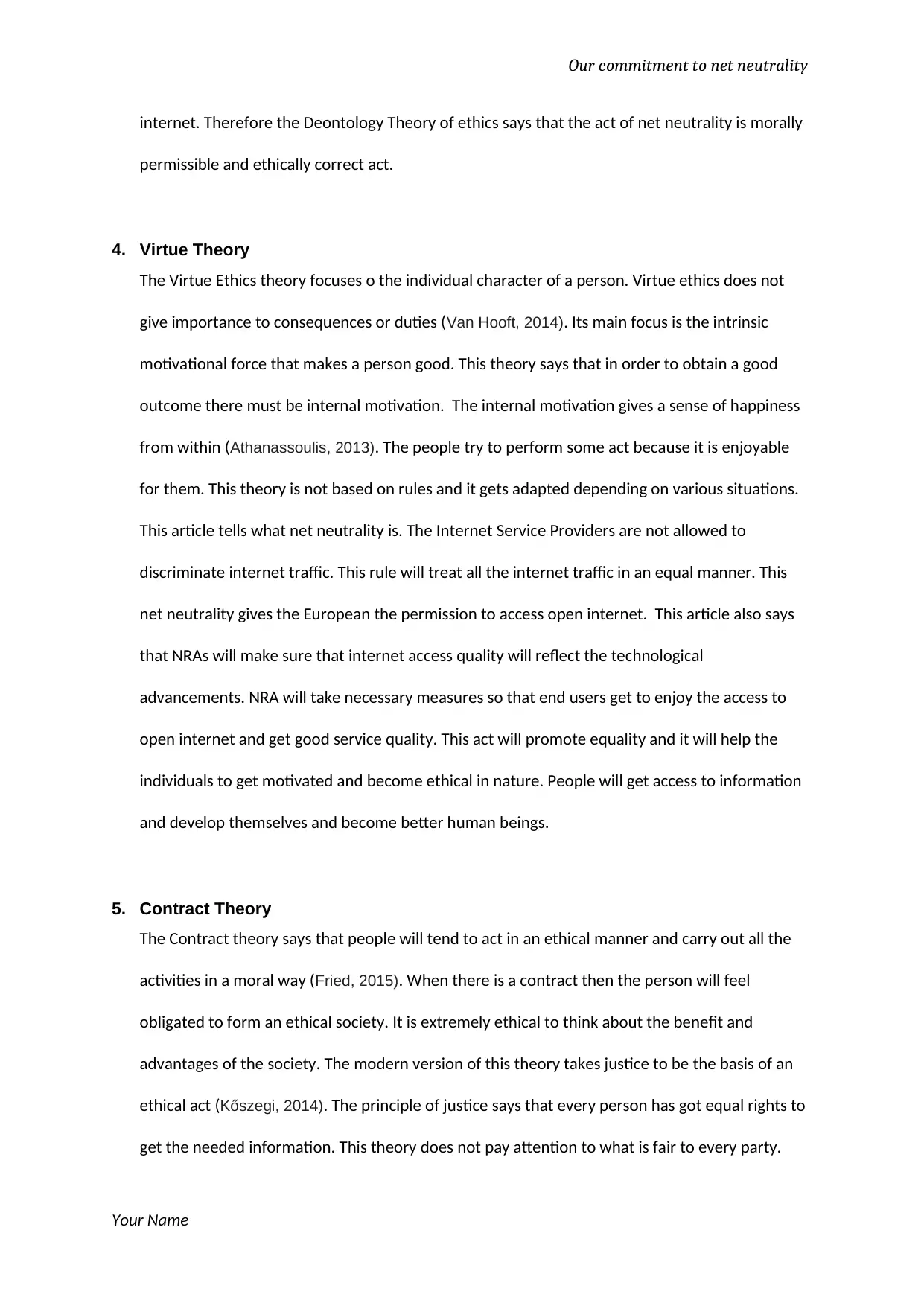
Our commitment to net neutrality
internet. Therefore the Deontology Theory of ethics says that the act of net neutrality is morally
permissible and ethically correct act.
4. Virtue Theory
The Virtue Ethics theory focuses o the individual character of a person. Virtue ethics does not
give importance to consequences or duties (Van Hooft, 2014). Its main focus is the intrinsic
motivational force that makes a person good. This theory says that in order to obtain a good
outcome there must be internal motivation. The internal motivation gives a sense of happiness
from within (Athanassoulis, 2013). The people try to perform some act because it is enjoyable
for them. This theory is not based on rules and it gets adapted depending on various situations.
This article tells what net neutrality is. The Internet Service Providers are not allowed to
discriminate internet traffic. This rule will treat all the internet traffic in an equal manner. This
net neutrality gives the European the permission to access open internet. This article also says
that NRAs will make sure that internet access quality will reflect the technological
advancements. NRA will take necessary measures so that end users get to enjoy the access to
open internet and get good service quality. This act will promote equality and it will help the
individuals to get motivated and become ethical in nature. People will get access to information
and develop themselves and become better human beings.
5. Contract Theory
The Contract theory says that people will tend to act in an ethical manner and carry out all the
activities in a moral way (Fried, 2015). When there is a contract then the person will feel
obligated to form an ethical society. It is extremely ethical to think about the benefit and
advantages of the society. The modern version of this theory takes justice to be the basis of an
ethical act (Kőszegi, 2014). The principle of justice says that every person has got equal rights to
get the needed information. This theory does not pay attention to what is fair to every party.
Your Name
internet. Therefore the Deontology Theory of ethics says that the act of net neutrality is morally
permissible and ethically correct act.
4. Virtue Theory
The Virtue Ethics theory focuses o the individual character of a person. Virtue ethics does not
give importance to consequences or duties (Van Hooft, 2014). Its main focus is the intrinsic
motivational force that makes a person good. This theory says that in order to obtain a good
outcome there must be internal motivation. The internal motivation gives a sense of happiness
from within (Athanassoulis, 2013). The people try to perform some act because it is enjoyable
for them. This theory is not based on rules and it gets adapted depending on various situations.
This article tells what net neutrality is. The Internet Service Providers are not allowed to
discriminate internet traffic. This rule will treat all the internet traffic in an equal manner. This
net neutrality gives the European the permission to access open internet. This article also says
that NRAs will make sure that internet access quality will reflect the technological
advancements. NRA will take necessary measures so that end users get to enjoy the access to
open internet and get good service quality. This act will promote equality and it will help the
individuals to get motivated and become ethical in nature. People will get access to information
and develop themselves and become better human beings.
5. Contract Theory
The Contract theory says that people will tend to act in an ethical manner and carry out all the
activities in a moral way (Fried, 2015). When there is a contract then the person will feel
obligated to form an ethical society. It is extremely ethical to think about the benefit and
advantages of the society. The modern version of this theory takes justice to be the basis of an
ethical act (Kőszegi, 2014). The principle of justice says that every person has got equal rights to
get the needed information. This theory does not pay attention to what is fair to every party.
Your Name
Secure Best Marks with AI Grader
Need help grading? Try our AI Grader for instant feedback on your assignments.
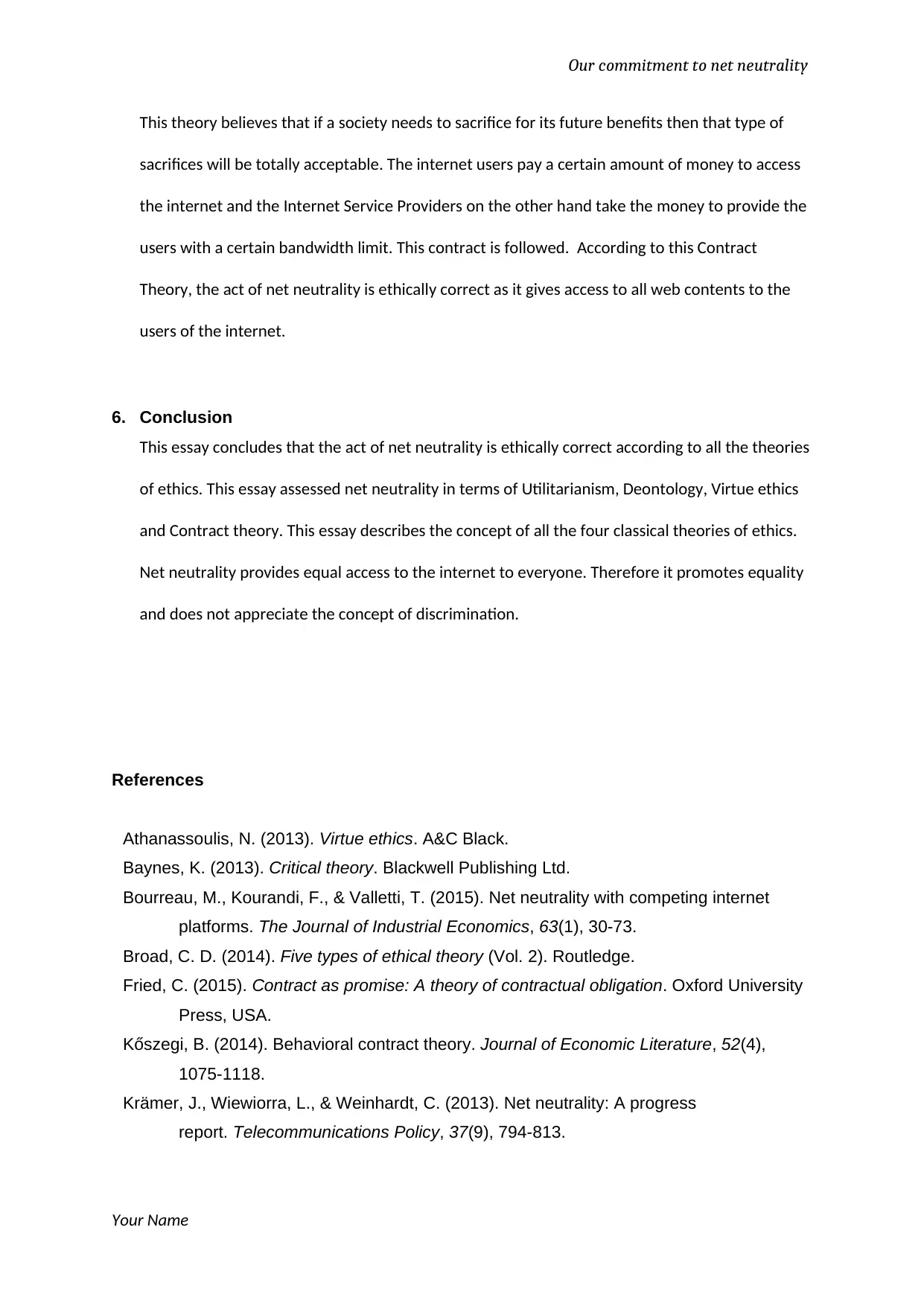
Our commitment to net neutrality
This theory believes that if a society needs to sacrifice for its future benefits then that type of
sacrifices will be totally acceptable. The internet users pay a certain amount of money to access
the internet and the Internet Service Providers on the other hand take the money to provide the
users with a certain bandwidth limit. This contract is followed. According to this Contract
Theory, the act of net neutrality is ethically correct as it gives access to all web contents to the
users of the internet.
6. Conclusion
This essay concludes that the act of net neutrality is ethically correct according to all the theories
of ethics. This essay assessed net neutrality in terms of Utilitarianism, Deontology, Virtue ethics
and Contract theory. This essay describes the concept of all the four classical theories of ethics.
Net neutrality provides equal access to the internet to everyone. Therefore it promotes equality
and does not appreciate the concept of discrimination.
References
Athanassoulis, N. (2013). Virtue ethics. A&C Black.
Baynes, K. (2013). Critical theory. Blackwell Publishing Ltd.
Bourreau, M., Kourandi, F., & Valletti, T. (2015). Net neutrality with competing internet
platforms. The Journal of Industrial Economics, 63(1), 30-73.
Broad, C. D. (2014). Five types of ethical theory (Vol. 2). Routledge.
Fried, C. (2015). Contract as promise: A theory of contractual obligation. Oxford University
Press, USA.
Kőszegi, B. (2014). Behavioral contract theory. Journal of Economic Literature, 52(4),
1075-1118.
Krämer, J., Wiewiorra, L., & Weinhardt, C. (2013). Net neutrality: A progress
report. Telecommunications Policy, 37(9), 794-813.
Your Name
This theory believes that if a society needs to sacrifice for its future benefits then that type of
sacrifices will be totally acceptable. The internet users pay a certain amount of money to access
the internet and the Internet Service Providers on the other hand take the money to provide the
users with a certain bandwidth limit. This contract is followed. According to this Contract
Theory, the act of net neutrality is ethically correct as it gives access to all web contents to the
users of the internet.
6. Conclusion
This essay concludes that the act of net neutrality is ethically correct according to all the theories
of ethics. This essay assessed net neutrality in terms of Utilitarianism, Deontology, Virtue ethics
and Contract theory. This essay describes the concept of all the four classical theories of ethics.
Net neutrality provides equal access to the internet to everyone. Therefore it promotes equality
and does not appreciate the concept of discrimination.
References
Athanassoulis, N. (2013). Virtue ethics. A&C Black.
Baynes, K. (2013). Critical theory. Blackwell Publishing Ltd.
Bourreau, M., Kourandi, F., & Valletti, T. (2015). Net neutrality with competing internet
platforms. The Journal of Industrial Economics, 63(1), 30-73.
Broad, C. D. (2014). Five types of ethical theory (Vol. 2). Routledge.
Fried, C. (2015). Contract as promise: A theory of contractual obligation. Oxford University
Press, USA.
Kőszegi, B. (2014). Behavioral contract theory. Journal of Economic Literature, 52(4),
1075-1118.
Krämer, J., Wiewiorra, L., & Weinhardt, C. (2013). Net neutrality: A progress
report. Telecommunications Policy, 37(9), 794-813.
Your Name
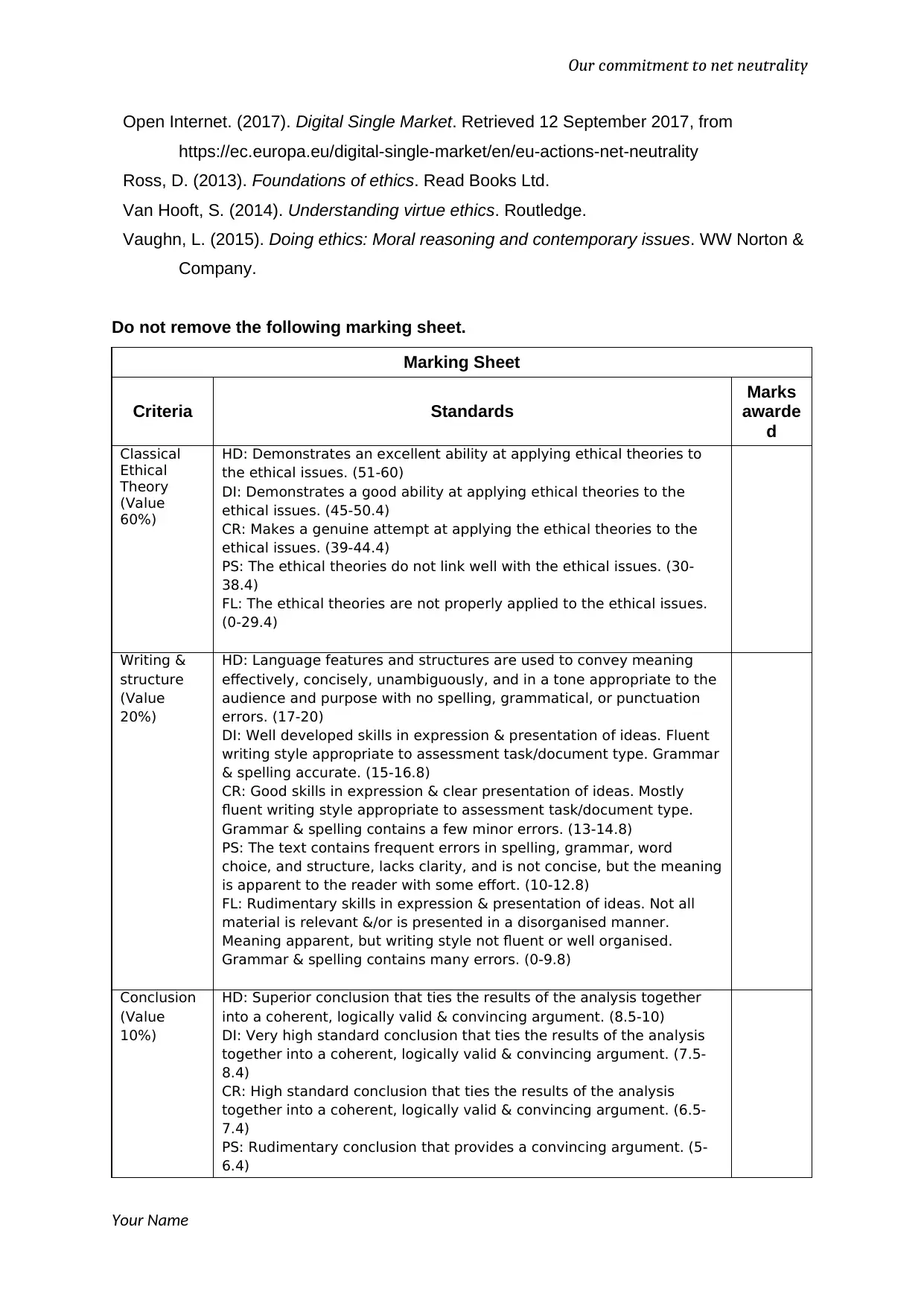
Our commitment to net neutrality
Open Internet. (2017). Digital Single Market. Retrieved 12 September 2017, from
https://ec.europa.eu/digital-single-market/en/eu-actions-net-neutrality
Ross, D. (2013). Foundations of ethics. Read Books Ltd.
Van Hooft, S. (2014). Understanding virtue ethics. Routledge.
Vaughn, L. (2015). Doing ethics: Moral reasoning and contemporary issues. WW Norton &
Company.
Do not remove the following marking sheet.
Marking Sheet
Criteria Standards
Marks
awarde
d
Classical
Ethical
Theory
(Value
60%)
HD: Demonstrates an excellent ability at applying ethical theories to
the ethical issues. (51-60)
DI: Demonstrates a good ability at applying ethical theories to the
ethical issues. (45-50.4)
CR: Makes a genuine attempt at applying the ethical theories to the
ethical issues. (39-44.4)
PS: The ethical theories do not link well with the ethical issues. (30-
38.4)
FL: The ethical theories are not properly applied to the ethical issues.
(0-29.4)
Writing &
structure
(Value
20%)
HD: Language features and structures are used to convey meaning
effectively, concisely, unambiguously, and in a tone appropriate to the
audience and purpose with no spelling, grammatical, or punctuation
errors. (17-20)
DI: Well developed skills in expression & presentation of ideas. Fluent
writing style appropriate to assessment task/document type. Grammar
& spelling accurate. (15-16.8)
CR: Good skills in expression & clear presentation of ideas. Mostly
fluent writing style appropriate to assessment task/document type.
Grammar & spelling contains a few minor errors. (13-14.8)
PS: The text contains frequent errors in spelling, grammar, word
choice, and structure, lacks clarity, and is not concise, but the meaning
is apparent to the reader with some effort. (10-12.8)
FL: Rudimentary skills in expression & presentation of ideas. Not all
material is relevant &/or is presented in a disorganised manner.
Meaning apparent, but writing style not fluent or well organised.
Grammar & spelling contains many errors. (0-9.8)
Conclusion
(Value
10%)
HD: Superior conclusion that ties the results of the analysis together
into a coherent, logically valid & convincing argument. (8.5-10)
DI: Very high standard conclusion that ties the results of the analysis
together into a coherent, logically valid & convincing argument. (7.5-
8.4)
CR: High standard conclusion that ties the results of the analysis
together into a coherent, logically valid & convincing argument. (6.5-
7.4)
PS: Rudimentary conclusion that provides a convincing argument. (5-
6.4)
Your Name
Open Internet. (2017). Digital Single Market. Retrieved 12 September 2017, from
https://ec.europa.eu/digital-single-market/en/eu-actions-net-neutrality
Ross, D. (2013). Foundations of ethics. Read Books Ltd.
Van Hooft, S. (2014). Understanding virtue ethics. Routledge.
Vaughn, L. (2015). Doing ethics: Moral reasoning and contemporary issues. WW Norton &
Company.
Do not remove the following marking sheet.
Marking Sheet
Criteria Standards
Marks
awarde
d
Classical
Ethical
Theory
(Value
60%)
HD: Demonstrates an excellent ability at applying ethical theories to
the ethical issues. (51-60)
DI: Demonstrates a good ability at applying ethical theories to the
ethical issues. (45-50.4)
CR: Makes a genuine attempt at applying the ethical theories to the
ethical issues. (39-44.4)
PS: The ethical theories do not link well with the ethical issues. (30-
38.4)
FL: The ethical theories are not properly applied to the ethical issues.
(0-29.4)
Writing &
structure
(Value
20%)
HD: Language features and structures are used to convey meaning
effectively, concisely, unambiguously, and in a tone appropriate to the
audience and purpose with no spelling, grammatical, or punctuation
errors. (17-20)
DI: Well developed skills in expression & presentation of ideas. Fluent
writing style appropriate to assessment task/document type. Grammar
& spelling accurate. (15-16.8)
CR: Good skills in expression & clear presentation of ideas. Mostly
fluent writing style appropriate to assessment task/document type.
Grammar & spelling contains a few minor errors. (13-14.8)
PS: The text contains frequent errors in spelling, grammar, word
choice, and structure, lacks clarity, and is not concise, but the meaning
is apparent to the reader with some effort. (10-12.8)
FL: Rudimentary skills in expression & presentation of ideas. Not all
material is relevant &/or is presented in a disorganised manner.
Meaning apparent, but writing style not fluent or well organised.
Grammar & spelling contains many errors. (0-9.8)
Conclusion
(Value
10%)
HD: Superior conclusion that ties the results of the analysis together
into a coherent, logically valid & convincing argument. (8.5-10)
DI: Very high standard conclusion that ties the results of the analysis
together into a coherent, logically valid & convincing argument. (7.5-
8.4)
CR: High standard conclusion that ties the results of the analysis
together into a coherent, logically valid & convincing argument. (6.5-
7.4)
PS: Rudimentary conclusion that provides a convincing argument. (5-
6.4)
Your Name
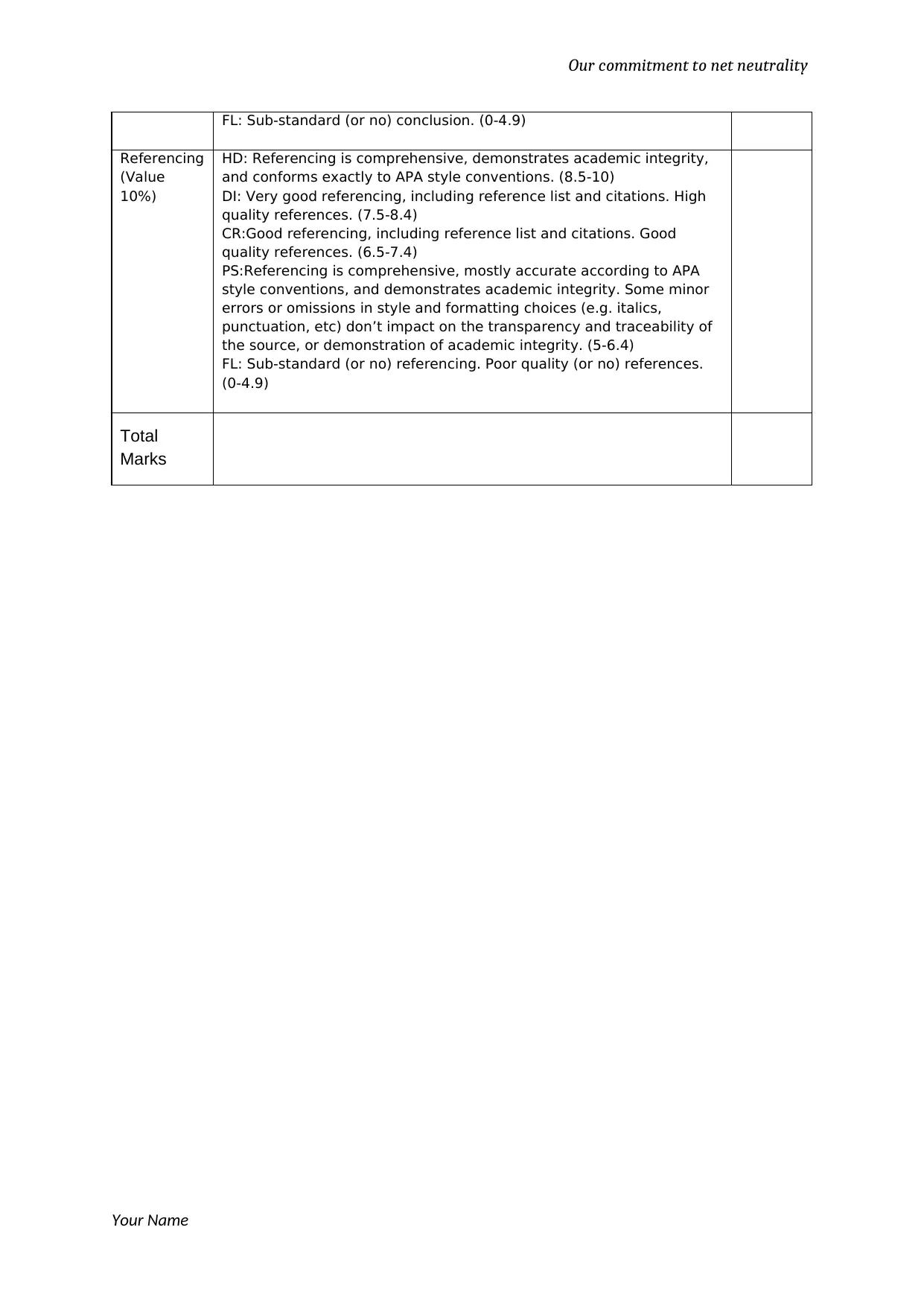
Our commitment to net neutrality
FL: Sub-standard (or no) conclusion. (0-4.9)
Referencing
(Value
10%)
HD: Referencing is comprehensive, demonstrates academic integrity,
and conforms exactly to APA style conventions. (8.5-10)
DI: Very good referencing, including reference list and citations. High
quality references. (7.5-8.4)
CR:Good referencing, including reference list and citations. Good
quality references. (6.5-7.4)
PS:Referencing is comprehensive, mostly accurate according to APA
style conventions, and demonstrates academic integrity. Some minor
errors or omissions in style and formatting choices (e.g. italics,
punctuation, etc) don’t impact on the transparency and traceability of
the source, or demonstration of academic integrity. (5-6.4)
FL: Sub-standard (or no) referencing. Poor quality (or no) references.
(0-4.9)
Total
Marks
Your Name
FL: Sub-standard (or no) conclusion. (0-4.9)
Referencing
(Value
10%)
HD: Referencing is comprehensive, demonstrates academic integrity,
and conforms exactly to APA style conventions. (8.5-10)
DI: Very good referencing, including reference list and citations. High
quality references. (7.5-8.4)
CR:Good referencing, including reference list and citations. Good
quality references. (6.5-7.4)
PS:Referencing is comprehensive, mostly accurate according to APA
style conventions, and demonstrates academic integrity. Some minor
errors or omissions in style and formatting choices (e.g. italics,
punctuation, etc) don’t impact on the transparency and traceability of
the source, or demonstration of academic integrity. (5-6.4)
FL: Sub-standard (or no) referencing. Poor quality (or no) references.
(0-4.9)
Total
Marks
Your Name
1 out of 7
Related Documents
Your All-in-One AI-Powered Toolkit for Academic Success.
+13062052269
info@desklib.com
Available 24*7 on WhatsApp / Email
![[object Object]](/_next/static/media/star-bottom.7253800d.svg)
Unlock your academic potential
© 2024 | Zucol Services PVT LTD | All rights reserved.





